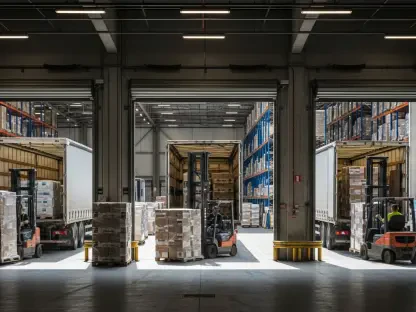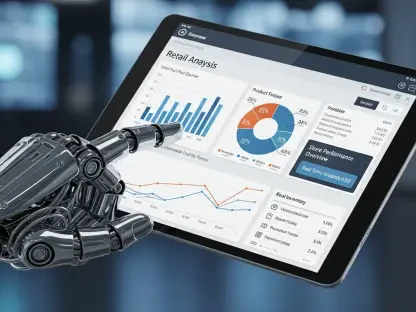The advent of the Internet of Things (IoT) has ushered in a new era of industrial efficiency, fundamentally transforming how industries operate. By connecting machines, sensors, and systems, IoT technology enables real-time data acquisition, predictive maintenance, energy management, and supply chain optimization. These advancements not only enhance operational precision but also lead to significant cost reductions and overall optimization in ways previously unimaginable. This comprehensive exploration of IoT’s impact on industrial efficiency showcases its transformative potential across various key areas, highlighting the critical importance of IoT in modern industrial practices.
The Power of Predictive Maintenance
IoT sensors continuously monitor critical machinery and equipment, capturing data on parameters such as temperature, vibrations, and performance metrics. The ability of IoT to gather and analyze this real-time data means that industries can now predict potential equipment failures before they occur. By shifting from reactive to predictive maintenance, companies can significantly reduce unexpected breakdowns, thereby minimizing downtime and the associated costs of emergency repairs.
Proactive maintenance strategies extend the lifespan of machinery, enabling safer and more efficient operational conditions. This transformation means maintenance teams can schedule repairs during non-peak hours, minimizing disruptions to production schedules. The integration of IoT technologies contributes not only to increased efficiency but also to substantial cost savings by optimizing maintenance operations. The use of IoT in predictive maintenance represents one of the most impactful ways industries can achieve operational excellence.
Moreover, real-time data from IoT sensors allows for the continuous monitoring of equipment performance, helping to predict and mitigate potential issues before they escalate. This reduces the need for costly repairs and replacements, fostering a more reliable and productive work environment. Overall, the shift to predictive maintenance facilitated by IoT technologies highlights how industries can enhance safety, reduce costs, and improve operational efficiency in an increasingly competitive landscape.
Optimizing Energy Management
Energy management is another critical area where IoT has made significant inroads, providing industries with the tools needed to track and optimize energy consumption. IoT-enabled systems offer real-time insights into energy consumption patterns and identify inefficiencies that may otherwise go unnoticed. For instance, these systems can detect when machinery is running unnecessarily or when HVAC systems cause temperature fluctuations, allowing facilities to address these inefficiencies promptly.
The ability to optimize energy usage in real-time leads to significant reductions in both waste and operational expenses. IoT-based energy management supports sustainability initiatives by enabling precise monitoring and reduction of energy consumption. Consequently, industries can achieve their sustainability goals while also cutting down on their carbon footprint, exemplifying a win-win scenario through IoT adoption.
Furthermore, detailed insights provided by IoT systems empower industries to make informed decisions about energy management, leading to cost-effective operations and a smaller environmental impact. The implementation of IoT in energy management aligns industrial practices with global sustainability goals, highlighting its transformative potential. As industries continue to seek ways to enhance operational efficiency and meet regulatory requirements, IoT-enabled energy management systems will play an increasingly vital role in achieving these objectives.
Streamlining Supply Chain Processes
The integration of IoT devices has revolutionized logistics and supply chain management, offering unprecedented levels of transparency and efficiency. By providing real-time tracking of shipments and monitoring inventory levels, IoT ensures greater accuracy and reduces the risks of loss or theft. This enhanced visibility allows companies to manage stock levels more effectively, avoiding the pitfalls of overstocking or stockouts and ensuring that supply chain operations run smoothly.
In addition to inventory management, IoT solutions enhance fleet management by monitoring vehicle performance, fuel consumption, and driver behavior. These insights allow for better route planning, reduced fuel costs, and timely deliveries, optimizing the entire logistics process. The comprehensive data provided by IoT devices support informed decision-making, which is crucial for improving supply chain operations and driving cost reductions.
Companies that embrace IoT for supply chain management benefit from more streamlined and efficient operations, resulting in reduced costs and improved service levels. The ability to monitor and adjust in real-time minimizes disruptions and enhances the overall reliability of the supply chain. The transformative impact of IoT on supply chain management underscores its importance in driving efficiency and cost-effectiveness across various industrial sectors.
The Necessity of Reliable Infrastructure
For IoT systems to function effectively, industries must invest in robust electrical infrastructure. Consistent and reliable power supply is crucial to ensure that IoT devices operate without interruption. Any disruptions in power can lead to data loss or system failures, which may negate the benefits of IoT technologies. Therefore, industries must prioritize the establishment of reliable electrical systems to support their IoT deployments.
Companies like ELSCO Transformers play a vital role in providing high-quality transformers and power systems that are essential for maintaining the continuous operation of IoT systems. A reliable infrastructure facilitates uninterrupted real-time data acquisition and system performance, enabling industries to fully harness the benefits of IoT. Investing in dependable power infrastructure is paramount for industries looking to maximize the potential of IoT technologies.
The importance of a stable power supply cannot be overstated, as it ensures that IoT systems can perform optimally and deliver accurate data for decision-making processes. Industries that prioritize infrastructure reliability are better positioned to leverage IoT technologies for enhanced efficiency and cost savings. As IoT continues to evolve, the need for robust infrastructure will remain a critical factor in its successful implementation and long-term impact on industrial efficiency.
The Future of IoT in Industrial Efficiency
The future of IoT in industrial contexts looks promising, with continuous advancements on the horizon. Enhanced data analytics, improved cybersecurity measures, and seamless system interoperability are expected to further bolster industrial efficiency. As IoT technology evolves, its ability to process and analyze vast amounts of data will improve, providing even more precise operational insights.
Industries stand to benefit from integrated systems that combine various IoT applications, creating holistic solutions tailored to specific industrial needs. The focus on cybersecurity will ensure that these systems are protected against potential threats, safeguarding sensitive data and maintaining operational integrity. The continued evolution of IoT promises to unlock new levels of efficiency, cost savings, and innovation across industrial sectors.
The potential for IoT to revolutionize industrial efficiency is immense, and as the technology progresses, industries will be able to achieve greater operational excellence and sustainability. The integration of advanced IoT solutions will drive innovation, enabling industries to remain competitive in an increasingly digital landscape. The future of IoT in industrial applications is bright, with the promise of continued advancements that will shape the future of industrial efficiency and cost reduction.
The Dual Goals of Sustainability and Cost-Efficiency
The emergence of the Internet of Things (IoT) has marked a significant shift in industrial efficiency, fundamentally altering the way industries function. By linking machines, sensors, and systems, IoT technology facilitates real-time data collection, predictive maintenance, energy management, and supply chain optimization. These advancements not only improve operational accuracy but also result in considerable cost savings and overall optimization that were once thought impossible. IoT’s impact on industrial efficiency is seen through its transformative potential in several crucial areas, underlining its vital role in current industrial practices.
In more detail, real-time data acquisition allows for more immediate responses to operational issues, reducing downtime and enhancing productivity. Predictive maintenance leverages the data collected to foresee equipment failures before they occur, thus avoiding costly interruptions. Energy management systems enabled by IoT can monitor and adjust energy usage dynamically, which results in reduced energy costs and a lower environmental footprint. Additionally, IoT dramatically improves supply chain management by providing better tracking, inventory management, and demand forecasting, creating a more streamlined and efficient process.
This comprehensive examination of IoT’s impacts underscores its revolutionary influence in modern industry, suggesting a future where connected technology leads to unprecedented levels of efficiency and precision.









